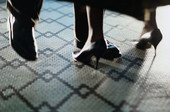
FRIDAY, July 16 (HealthDay News) — High heels may turn heads, but new research shows the long-term cost of wearing them is even steeper than the sky-high price tag of some coveted brands.
Along with aching feet and a variety of foot deformities, years of high-heel wearing can actually alter the anatomy of the calf muscles and tendons, according to a study by researchers in England, published online July 16 in the Journal of Experimental Biology.
The incline of high heels causes the calf muscles to contract. Over time, this causes the muscle fibers to shorten and the Achilles tendon to thicken, so much so that some women feel pain when they try to walk in flats or sneakers.
“You put on heels, you are going to deform your body. End of story,” said New York City podiatrist Dr. Johanna Youner, a spokeswoman for the American Podiatric Medical Association who was not involved with the research. “High heels look beautiful, but the body isn’t meant to wear them. There is no way around it.”
For the study, Marco Narici of Manchester Metropolitan University and colleagues recruited 80 women aged 20 to 50 who had been wearing heels of at least 2 inches almost daily for two years or more. Of those, 11 said they experienced discomfort when walking in flatter shoes.
When compared with women who did not wear heels, ultrasounds revealed the women who wore heels had calf muscle fibers that were 13 percent shorter, while MRIs showed the Achilles tendon, which attaches the heel bone to the calf muscle, was stiffer and thicker.
“This is a great study that looks at the mechanism of how high heels may cause grief and aggravation to the woman wearing them,” said Marian Hannan, a senior scientist at the Institute for Aging Research at Hebrew SeniorLife in Boston, who was not involved in the research. “This may have an impact on how future shoes are designed and help the industry understand how women can be slaves to fashion but not suffer so much physical discomfort.”
It’s not a big leap to know that shoes that hurt can’t be good for you, Youner said. For example:
- High heels put stress on the back and knees. Squeezing into high heels with narrow toe boxes can cause a condition called Morton’s neuroma, a painful thickening of tissue between the third and fourth toes.
- Haglund’s deformity, sometimes called the “pump bump,” occurs when back straps of heels dig into the tissue around the Achilles tendon. Too-tight shoes can bring on bunions, an enlargement of bone or tissue at the base of the big toe that pushes the big toe toward the second toe.
- Pointy shoes can worsen hammertoe by forcing the toes to bend at the middle joints, eventually causing them to stay bent and rigid even when barefoot.
- And then there are those uneven-sidewalk wipeouts that lead to ankle sprains and breaks.
The fix for many of these conditions, podiatrists said, may come as bad news for those emulating “Sex and the City” fashionista Carrie Bradshaw: Box up your stilettos, take over-the-counter anti-inflammatories if necessary, and wear more sensible footwear.
“I tell a lot of women to put on sneakers and take Aleve,” Youner said. “A heel will make a woman’s butt stick out and makes the body look taller, thinner. Society pushes us to look a certain way, and all women want to look attractive. In reality, it can be crippling, and it is literally changing the shape of the body.”
And don’t think those now ubiquitous flip-flops are your solution. Flip-flops offer no arch support or shock absorption, and the toes have to scrunch with every step to keep the foot from slipping, experts said.
“I have recently seen some lovely flip-flops injuries,” Youner said. “Flip flops are meant for the beach, not for walking on cement or on vacation or at an amusement park. If you wear them, you are treating your feet poorly and you will eventually pay for it.”
If you must wear heels, minimize the time you spend on your feet, wear wider heels that distribute the weight better and shop for shoes at the end of the day when your foot is larger, Hannan said.
More information
The American Podiatric Medical Association has more on choosing proper footwear.

